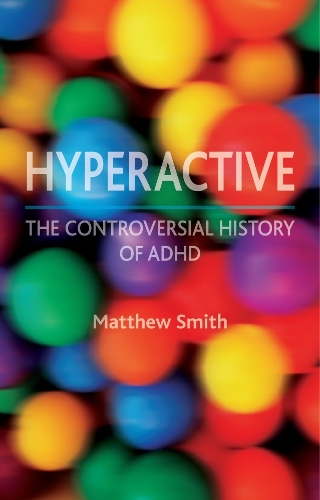
Hyperactive: The Controversial History of ADHD
(Paperback)
Publishing Details
Hyperactive: The Controversial History of ADHD
By (Author) Maitrii Aung-Thwin
By (author) Michael Aung-Thwin
Reaktion Books
Reaktion Books
1st August 2012
United Kingdom
Classifications
General
Non Fiction
Child, developmental and lifespan psychology
Neurology and clinical neurophysiology
616.8589
Physical Properties
Paperback
248
Width 216mm, Height 138mm
Description
Attention deficit hyperactivity disorder, or ADHD, is one of the most common developmental disorders. It is also one of the most controversial. Since the 1950s, when hyperactivity in children was first diagnosed, psychiatrists, educators, parents and politicians have debated the causes, treatment and implications of the disorder. Hyperactive: The Controversial History of ADHD is the first history of the disorder. Matthew Smith highlights the limitations of regarding ADHD as simply neurological, and contends that hyperactive children are also a product of their social, cultural, political and educational environment. Instead of simply accepting conventional understandings of ADHD, this book addresses the questions central to the emergence of the disorder: Why were children first diagnosed with the disorder Why did biological explanations become predominant Why did powerful drugs become the preferred treatment And why have alternative explanations failed to achieve legitimacy
Reviews
A Choice Outstanding Academic Title, 2013 * Award *
Smith addresses biological, social and psychological issues, from an eighteenth-century description of the fidgets to the first cases, the drugs and the diets. With powerful pharmaceuticals involved and US diagnoses running at 9% a year in 5- to 17-year-olds, this is a timely chronicle. * Nature *
Matthew Smith doesnt dispute that some kids act up but then they always did, he says. That the ADHD diagnosis is a help to parents and teachers isnt in doubt perhaps, though, this says more about the way weve been trying to micromanage our childrens behaviour than it does about any disorder. * The Scotsman *
Hyperactive is a well-researched, well-organized, and well-written history of the development of the highly variable perception, understanding, and treatment of attention deficit hyperactivity disorder (ADHD). Smith provides a logically strong argument for considering ADHD as a highly complex disorder arising from a number of contributing variables . . . What makes this work outstanding is its readability and continuity of story line. Essential. * Choice *
Hyperactive tells a compelling story of the confluence of interests of psychiatrists, pharmaceutical companies, educators, and parents . . . a valuable contribution to the history of psychiatry, behavioral medicine, pharmacology, and mental health policy in the twentieth century and will be useful to a wide audience. * Journal of the History of Medicine and Allied Sciences *
As a medical historian, teacher and father of a particularly bouncy boy, Matthew Smith brings crucial balance to this far-from settled area. His meticulous analysis reveals the rival biomedical, social and psychoanalytical conceptualisations of both causes and treatment down the decades effectively a mini-history of psychiatry . . . This is no self-help guide though, but what should precede one: a history arming health professionals, educators and parents with context, open minds and caution, while always keeping the childs interests paramount. * North and South Magazine, New Zealand *
Matthew Smith persuasively demonstrates the historical contingency of our ideas about hyperactivity. Well written, complex yet sharply argued, this book is a sorely needed corrective to todays therapeutic common sense and the ocean of pharmaceuticals it sanctions. * David Herzberg, Associate Professor, University at Buffalo (SUNY) and author of Happy Pills in America: From Miltown to Prozac *
As Matthew Smith demonstrates in this excellent study, there is arguably no more contentious childhood condition than hyperactivity or ADHD. Since the term was first introduced in the decades following the Second World War, hyperactivity has been variably explained in terms of genetic constitution, faulty parenting, an inability to cope with the pace and pressure of modern life, and increased sensitivity to food additives. Hyperactive explores debates about the biological, social and cultural contours of a condition that continues to puzzle doctors, frustrate teachers, and destroy families. It will surely be of value not only to historians of medicine, but also to the parents, teachers, psychiatrists and policy-makers involved in the daily struggle to cope with hyperactive children. * Mark Jackson, Professor of the History of Medicine at the University of Exeter and author of The Age of Stress: Science and the Search for Stability *
Matthew Smith contributes a highly engaging and important historical perspective to the alleged epidemic in hyperactivity. His book is a masterfully written account that challenges us to think critically about how our modern culture has given rise to a sub-population of children with allegedly disruptive behaviours. At the core of this book Smith boldly asks whether such actions deserve to be better treated or simply better understood. * Erika Dyck, Canada Research Chair in History of Medicine at the University of Saskatchewan, and author of Psychedelic Psychiatry: LSD from Clinic to Campus *
Matthew Smith dramatically presents the tangled history of a highly conflicted topic, perceptively examining pertinent biological, psychological, and social theories, professional authority, and pharmaceutical marketing, in the light of the day-to-day realities faced by schools, physicians, parents, and children labeled as hyperactive. For anyone personally or professionally concerned with ADHD, this book demonstrates how critically important it is for us to understand the issue in its historical context. * Rima D. Apple, Professor Emerita, University of Wisconsin-Madison and author of Perfect Motherhood: Science and childrearing in America and Vitamania: Vitamins in American culture *
Author Bio
Matthew Smith is a Lecturer and Wellcome Trust Research Fellow at the University of Strathclyde. He is a past winner of the Roy Porter Prize and the Pressman-Burroughs Wellcome Award, and was named a BBC Radio 3 New Generation Thinker for 2012.
